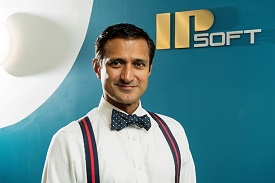Attention CIOs: AI Will Transform How You Do Your Job
Any discussion regarding artificial intelligence inevitably leads to conversations about jobs. Will AI take mine? What will my role be when AI automates my current responsibilities? Should I be learning new skills to stay relevant? These are certainly important questions given that enterprise AI adoption is accelerating. In Gartner’s 2019 CIO Survey of 3,000 CIOs across 89 countries, AI took the top spot among respondents as the technology with the highest potential to disrupt current business models, while 37% said they have already deployed AI technology or will do so in the short term.
Much of the attention on AI and jobs is usually focused on rank-and-file employees or those with rote operational or transactional duties. For some time, the industry has endorsed a vision of a future enterprise with plenty of room for both human and digital workers to survive and thrive in a hybrid workforce. However, the more urgent discussion about AI’s impact on roles should be taking place among senior corporate leaders: CIOs, IT managers and those involved in enterprise operations. Adopting a reactive stance to AI’s emerging impact on jobs and waiting to see how it will influence their own is beside the point and counterproductive. CIOs should be thinking much more broadly and proactively about how AI will impact operations, IT support and their IT staff.
Let’s be clear: Some parts of a CIO’s job remain constant and are unlikely to change regardless of the latest shifts in technology. There will always be a need to build budgets and use cases, perform due diligence during vendor evaluations, and provide short- and long-term views on technology direction and investment. Nonetheless, a modern CIO in an age of AI will need to move beyond these more tactical exercises and think about how to be a digital business enabler. Not just a provider of technology but also a supplier of critical services that impact internal and external audiences. To be sure, some CIOs are getting the message. For example, themes around digital services, strategies and transformation will dominate this year’s MIT Sloan CIO Symposium in May.
Let’s think about how a CIO’s role and thinking can transform with AI in three specific areas:
IT operations: Most CIOs are burdened IT support: Automation and cognitive AI can make current support ticketing systems look like long-lost relics. Most CIOs, I believe, are desperate for a better way forward, and want interactive conversations powered IT staff: Every CIO has their own ideas on how to keep staff motivated when facing a voluminous ticket queue or performing what feels like an endless stream of rote activities such as password resets. However, bringing AI into an organization, and allowing automation and cognitive platforms to take over lower-value high-volume tasks, can potentially turbocharge an IT staff that is eager to develop new products and services, learn new skills and innovate with their colleagues. Clearly, it requires a balance: Taking tasks, even repetitive ones, out of staff’s hands is bound to make them nervous. It’s incumbent upon the CIO to stay ahead of that team apprehension and demonstrate true leadership. A CIO can identify who on their team would benefit most from new skills, who can be transitioned to new, even unexpected roles and what new, high-value projects should be tackled first.
Sitting back and being a reactive observer to how AI will alter your work is no longer an option for enterprise CIOs. Get ahead of the trend, take control of the wheel and drive AI projects and implementations toward a result that will ultimately prove more valuable to your company and your career — before AI does it for you.

Chetan Dube is the President and CEO of IPsoft and is a widely recognized speaker on autonomics, cognitive computing and the future impact of a digital workforce. He is a mathematician, and prior to joining IPsoft he served as an assistant professor at New York University.
